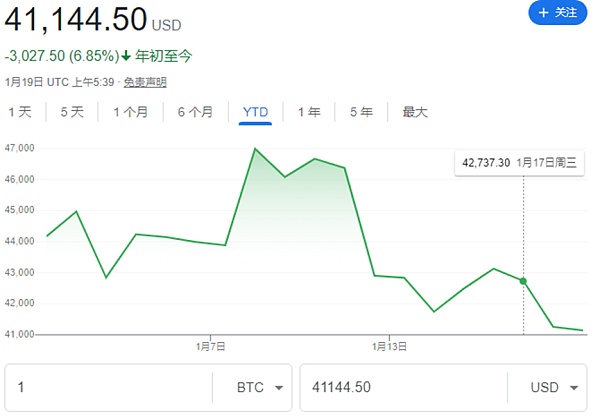At a time when the price of Bitcoin is falling, the inflow of funds into Bitcoin ETFs is still considerable; on Wednesday, BlackRock's Bitcoin ETF received an inflow of US$371 million, helping It broke the $1 billion mark.
Bitcoin's rising tide has receded significantly this week, and the price of Bitcoin has fallen since the U.S. Securities and Exchange Commission approved the listing of a Bitcoin ETF on January 10 About 11%.

Bartosz Lipinski, CEO of trading platform Cube.Exchange, said that the hype related to Bitcoin ETFs has weakened and traders' attention may shift elsewhere. Options data currently suggests Bitcoin support is around $40,000.
However, on the basic asset of Bitcoin, investors have temporarily "retired", but its derived ETF funds continue to be prosperous. Data showed that investors deposited US$371 million into BlackRock's Bitcoin ETF on Wednesday, pushing the total size of the fund to exceed US$1 billion, becoming the first Bitcoin ETF to do so.
In addition, Fidelity’s Bitcoin fund has reached US$880 million, approaching the US$1 billion mark. Together, these two funds accounted for 68% of the inflows into Bitcoin ETFs, totaling nearly $2 billion.
The fiery battlefield
Strategas’ ETF strategist Todd Sohn said this situation would not be surprising if it were the BlackRock ETF. BlackRock has always attached great importance to assets such as cryptocurrency and has a lot of hidden power.
According to media investigations, a large part of the funds flowing into Bitcoin ETFs such as BlackRock and Fidelity came from Grayscale’s Bitcoin ETF. The fund was previously a trust fund and was later converted into an ETF. Its managed funds once exceeded US$28 billion, but currently there have been US$1.6 billion in outflows.
An important reason why investors left Grayscale was that management fees were too high. Grayscale’s Bitcoin ETF management fee is currently the highest in the industry, reaching 1.5%. According to media reports, in order to attract investment, BlackRock and Fidelity currently set management fees of only 0.2% and 0% respectively.
Since ten Bitcoin ETFs were listed at the same time, this has set off a very fierce competition in the industry, and management fees are currently the most important for major funds. chips. For example, Fidelity has promised to waive investor management fees until July 31.
Some people use "cheating" tricks. Ark Asset Management, managed by Cathie Wood, a well-known Wall Street investor, is snapping up the Bitcoin ETF it launched and using its sister fund to buy the Bitcoin ETF (ARKB).
Industry insiders pointed out that this trick is a bit like "cheating", but it is not illegal, and other people in the industry may also use it. Other Bitcoin ETF issuers may put the product into model investment portfolios or adopt other methods of increasing holdings.
Faced with fierce competition, Grayscale's mentality is as stable as that of an experienced driver. Zach Pandl, managing director of Grayscale Research, pointed out that Grayscale has dominated Bitcoin investment for more than a decade. Now that other issuers have entered the market, it is understandable that funds will flow to other new products.
He also said that the flow from one Bitcoin ETF to another Bitcoin ETF will not change the sentiment of the industry, and the total net inflow is the basis for judging value.
Nate Geraci, president of ETF Store, pointed out that if the charm of Bitcoin ETFs in attracting funds continues, issuers will be more bold in launching various products. Leveraged, inverse and options-based Bitcoin ETF strategies will all appear.
 JinseFinance
JinseFinance









